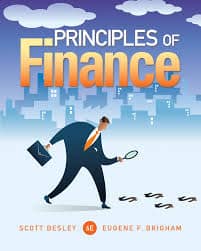Principles act as some sort of guideline that ensures things are done the right way. When it comes to financing, certain principles must be followed by the company in order to utilize the funds that they have. Hence, the principles of finance are a guideline that helps business owners make accurate financial decisions. In this post, we will be discussing the 6 principles of finance along with its syllabus, course, and the principles of finance book free downloads.
You are welcome to join us.
Why Principles of Finance?
To maximize benefit, proper financing must adhere to six core financial principles. In a nutshell, finance is the management of money. Financial managers are well-known individuals who are in charge of managing the fund.
- For you to be successful in any business or financial dealings, you should consider having and outlining principles to adhere to. This simply directs your finances in the right direction as well as gives anyone managing the finances the right insight.
- Managers will definitely need knowledge of principles for the purpose of the right investment.
- Maximization of profit is another reason why you should have the knowledge of principles. The majority of businesses are set up for the purpose of profit, but not all make profits. If you want to make lasting profits for your business, you should take the principles of finance courses.
Principles of Finance
You should be able to apply the principles of finance properly and know its effectiveness only if you know the importance of the principles of finance. Here is a list of some of the basic principles of finance
#1. Money Time Value
This principle only implies that money should be invested to make more money. As long as inflation continues, a dollar earned today will be more valuable than a dollar earned in the future because the average prices of goods and services keep racing up, especially during inflation.
#2. Risk and Reward
Understanding this principle means you understand the concept of the fact that no reward comes without a risk. Finances are always tagged along with risk-taking.
You should also understand, however, where and when to take this risk, because a high-risk investment with a little profit is a total waste of resources. That is why you should think and calculate before deciding on a risky action.
#3. Effective Financial Markets in Pricing Securities
The financial market always follows historical information of a company like its supply and demand and future forecasts. Although this might be the best for investors because the financial environment is always changing and the financial markets are always efficient themselves.
#4. Diversity
Distributing investments can reduce the investors’ risk because a lack of this diversified investment can increase his market risk. For example, if an investor invests in oil stock and there happens to be a shortage of oil in the market place all his holdings will therefore be affected. Meaning that if the investor has a diversified investment and the oil stock goes wrong he still has different options to explore.
This principle is basically advising you not to put all your eggs in one basket. To ensure these principals are investors shouldn’t always go for a high-risk investment for a mix of both high-risk and low-risk so that ultimately risk could be avoided.
#5. Cash Flow
The cash flow principle primarily covers cash entry and outflow, with more cash inflow occurring earlier in the period being preferred by investors than later cash flow. This approach favors earlier rewards rather than later years’ benefits since it also adheres to the time value principle.
#6. Profitability and Liquidity
From the standpoint of the investor, the principle of profitability and liquidity is crucial because the investor is responsible for ensuring both profitability and liquidity. The investment’s liquidity, or how simple it is to sell it for cash, reveals how marketable the investment is. Conversely, investors must make investments that can guarantee the maximizing of profit with a low or moderate amount of risk. To ensure that all tax obligations are met, it is better to have a certified accountant handle this.
#7. Hedging
According to the hedging principle, we must borrow money from reliable sources, finance our short-term fund needs with short-term sources, and manage our long-term fund needs with long-term sources. Long-term sources of funding must be used for fixed asset purchases.
Finally, you will be able to make sound financial judgments if you have a fundamental understanding of finance and its principles. Additionally, there is a greater chance of achieving financial success.
Principles of Finance Course
Some of the basic courses in finance are taught in schools and universities. These principles of finance courses take months to be taught. Also, these courses are open for application to any one of your choice. Taking any of the needed principles of finance courses might just be what you need to get the success of your finance started.
Principles of Finance Syllabus
The Principles of Finance Syllabus is a broad course that is also widely studied in schools and institutions. Discussing the principles of the finance syllabus separately and individually in its forms might take up a long period and time to conclude.
That is why the principles of the finance syllabus are made available for you to easily follow closely at any school or institution of your choice in learning through the syllabus of principles of finance.
1:1 Introduction to Finance, Financial Statements, and Financial Analysis
- Introduction to Concepts in Finance
- Ethics
- Financial Decisions: Investment and Financing
- Bonds
- The Basics of Interest Rates Page
- Additional Detail on Interest Rates Page
- Key Characteristics of Bonds Page
- Advantages and Disadvantages of Bonds Page
- Understanding Bonds Page.
- Types of Bonds Page
- Bond Markets Page.
- Valuing Bonds Page
- Bond Risk Page
- Stock Valuation
- Defining Stock Page
- Types of Stock Page.
- Rules and Rights of Common and Preferred Stock Page
- Stock Markets Page
- Stock Valuation Page
- Valuing the Corporation Page
- Institutions, Markets, and Intermediaries
- Institutions, Markets, and Intermediaries Page.
- Securities
- The Security Markets Page
- Understanding Returns Page.
- Market Efficiency Page
- Market Regulation Page
Read also: FINANCIAL MARKET: All you should know with Practical examples (+ free pdfs)
1.2: Corporate Finance and Corporate Structures
- Corporate Stocks and Bonds Page.
- Corporate Finance
- The Corporate Bonds Page
- Convertible Securities Page.
- Options Page
- Warrants Page
- Derivatives Page.
- Managing Risk with Derivatives
- Liability of Principal and Agent
- Liability of Principal and Agent URL
- Equity Finance
- Equity Finance Page
1.3: Financial Statements
- Introduction to the Balance Sheets Page
- More on Balance Sheets and Equity Pages
- Introduction to the Income Statement Page
- Cash Accounting Page.
- Accrual Basis of Accounting Page
- comparing accrual and cash accounting pages.
- Balance Sheet and Income Statement Relationship Page.
- Basic Cash Flow Statement Page
1.4: Financial Statements, Taxes, and Cash Flow
Complete principles of finance syllabus overview.
- Introducing the Financial Statements Page.
- The Income Statement Page
- The Balance Sheet Page
- The Tax Considerations Page
- The Statement of Cash Flows Page
- Other Statements Page
- Analyzing Financial Statements
- Standardizing Financial Statements, Page
- Overview of Ratios Pages
- Profitability Ratios Page
Read also: Financial literacy for kids: Basic lessons
- Asset Management Ratios Page
- Liquidity Ratios Page
- Debt Management Ratios
- Market Value Ratios Page
- The DuPont Equation, ROE, ROA, and Growth Page
- Using Financial Ratios for Analysis Page.
- Considering Inflation’s Distortionary Effects
- Other Distortions Page
- Forecasting Financial Statements
- Forecasting the Income Statement Page
- Forecasting the Balance Sheet Page
- Building a Cash Budget Page
- Analyzing Forecasts Page
- 1.3.4: The Statement of Cash Flows
- The Statement of Cash Flows Page
Read also: Public financial management: Detailed guide
Free books for download on the principles of finance
Books generally are knowledge enhancement. So these free books for download are another one-way ticket to the field of principles of finance.
- Principles of finance Drive
- finance open textbook free books for download on the principles of finance
- Manual solutions to the principles of finance
Starting up a business, you will need all the different opinions and suggestions even ideas you can possibly get from business experts and experienced businessmen/women who have been in the business field as well as taking business risks.
Distance could be a barrier to hearing these experts speak. That is one of the reasons why these free books for download on the principles of finance are available to you on a go.
Who is the father of finance?
The “founder of contemporary finance” is Eugene F. Fama, a 2013 Nobel winner in economic sciences. His work is well known among academics and financial circles.
What is the most important principle of finance?
The most crucial financial concept to comprehend while building a new product is undoubtedly cash flow. Without realizing this, you risk running out of funds and never being able to launch your product or generate a positive cash flow.
Why is it called finance?
The term “finance” also first appeared in English in the 15th century, but it derives from the Anglo-French verb finer, which both means “to end” and “to pay.” The phrase started to be used to describe financial assets and money management in the 18th century.
Who started finance?
The beginning of civilisation is where money has its roots. Around 3000 BC is the oldest historical indication of finance. In the Babylonian empire, where temples and palaces were employed as secure storage facilities for riches, banking first emerged.
Who founded the financial system?
Budgetary politics. James Madison and Alexander Hamilton got together at Thomas Jefferson’s house on Maiden Lane in New York that evening on June 20, 1790. The three came to a historic agreement over an extended meal that established the financial framework for the young country.
Conclusion
In conclusion, the principle of finance is a topic every business owner or aspiring business owner should have a grounding knowledge of before venturing into business to enable the business to stand strong and also be able to make financial decisions.
FAQs On Principles of Finance
What are the types of finance?
Personal finance, corporate finance, and public (government) finance are the three primary subcategories within the field of finance.
What is the first principle of money?
The first money principle is: Don’t lie about your money. The Second Money Principle is to focus on what you have rather than what you don’t have.
What are the four basic principles of finance?
Financial accounting measurement is based on four fundamental principles: (1) objectivity, (2) matching, (3) revenue recognition, and (4) consistency. The equity method is a special method used to value certain long-term equity investments on the balance sheet.






